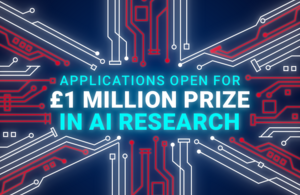Prize opens for AI energy, environment, and infrastructure innovations
Entries now open for the Manchester Prize, with a focus on AI innovations across energy, the environment and infrastructure.

Applications have opened for the Manchester Prize
- Entries open for landmark £1 million Manchester Prize, for pioneering AI innovations tackling some of society’s biggest challenges
- principal areas of focus for the inaugural prize centre on energy, the environment and infrastructure, coming as global climate conference COP28 continues in the UAE
- the Manchester Prize is set to put brilliant UK-based AI minds at the heart of problem solving
The UK’s brightest minds in AI can now enter a new £1 million prize to showcase their innovative ideas to tackle some of the biggest challenges in society.
The Manchester Prize, launching for the first time today (Thursday 7 December), forms part of the government’s dedication to placing the UK at the forefront of the AI revolution, supporting the best and brightest to develop the technologies of tomorrow.
AI is already starting to unlock enormous opportunities in tackling climate change, transforming healthcare, and beyond, and this Prize looks to spark more cutting-edge innovations in using safe AI for good, which will deliver real change for people across the country.
Viscount Camrose, Minister for AI and Intellectual Property, said:
Our decade-long funding commitment for the Manchester Prize will allow the UK to continue harnessing the transformative opportunities of AI for public good.
AI is already helping us to slash carbon emissions, unlocking incredible advances in healthcare and even improving our productivity in the workplace.
The focus of this prize in helping tackle some of society’s most pressing challenges serves as a real call to arms for people and organisations from all walks of life to bring forward ingenious solutions.
For the first two years, the prize will focus on solutions to the challenges surrounding energy, environment and infrastructure. This could include using AI technology to support the transition to electric vehicles by optimising charging methods, reduce household energy consumption by using AI to identify targeted interventions like adding insulation or help lower costs for consumers by automating energy-intensive processes in manufacturing. AI is a critical tool in the fight to help us significantly cut emissions by 2030 as we work towards net zero by 2050, including by accelerating plans to decarbonise the energy sector and the wider economy.
The prize, delivered by Challenge Works, marks the beginning of a decade-long commitment from the Department for Science, Innovation and Technology, building on the £3.5 billion injection to make the UK a science and technology superpower announced in this year’s Spring Budget. This is delivering a £2.5 billion Quantum Strategy which will bring new investment, fast-growing businesses and high-quality jobs to the UK, cementing its reputation as a top location to commercialise quantum; and £1 billion to create the next generation of supercomputing and AI research to establish the UK as a science and technology superpower.
Jeremy Hunt, Chancellor of the Exchequer, said:
Manchester is the birthplace of the world’s first modern computer, and has inspired countless innovations in computer science. I hope this prize will in turn inspire the next generation to tackle some of society’s biggest challenges.
The UK is the leading European tech ecosystem ahead of Germany and France, and with initiatives like this we can cement our position as a science and technology superpower, helping grow our economy.
The Manchester Prize is an open competition, enabling a much broader community of innovators to enter, and allowing the UK to draw on talent across all sectors. The namesake of the Manchester Prize is the Manchester Baby, the world’s first computer with an electronic memory, which was built at the University of Manchester.
Andrew Bowie, Energy Minister, said:
Embracing AI could help build on the incredible progress we have made to decarbonise our energy system. From predicting real-time solar power generation to better grid management, the technology has huge potential to help cut emissions by 2030.
The Government has already provided £3.75 million for AI-based decarbonisation projects, and this new competition funding is an exciting opportunity to unleash new innovation.
The first Manchester Prize, which opens for entries today, will run to March 2025. Entries are encouraged from UK-based companies, non-profits, universities and charities, with a deadline of 1st February 2024. In April, up to 10 entries will be chosen to move forward, and each of these finalists will win a prize of £100,000 to develop their ideas into a working prototype. One of these teams will go on to win the £1 million grand prize.
To select the most promising solutions, the finalists and ultimate winner of the grand prize will be chosen based on five judging criteria: how innovative their solution is compared to current state of the art technology, the impact of the solution, long-term viability, feasibility of delivering a working prototype, and evidence of safe and ethical AI development.
Manchester Prize finalists will also benefit from a range of non-financial support, including a package of free compute power to deliver their solutions. Furthermore, finalists will interact with key stakeholders, potential investors in and adopters of their technology in the public and private sectors, to share knowledge and encourage collaboration.
Notes to editors
For more details on the entry process, visit manchesterprize.org.
Entries can come from individuals, companies and other types of organisations, or a consortium of any combination of these, but must nominate one lead individual/organisation. Teams must be based in the UK and be able to receive funds into a UK bank account in the name of the lead entrant. In the case of consortia, only the lead partner needs to be based in the UK.
Finalist and grand prize money does not need to be repaid, we do not take any equity and entrants do not sign away Intellectual Property rights.